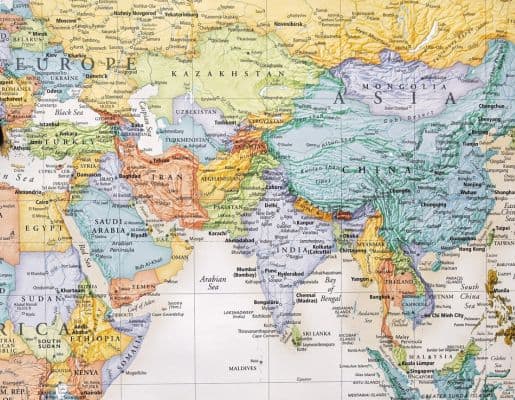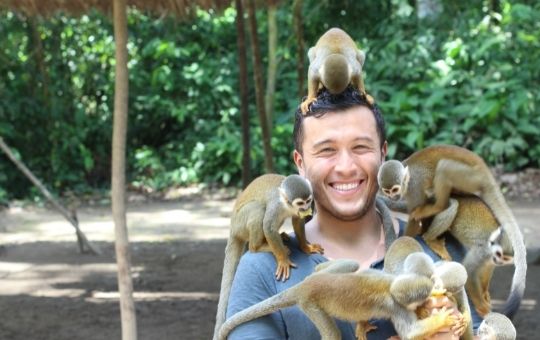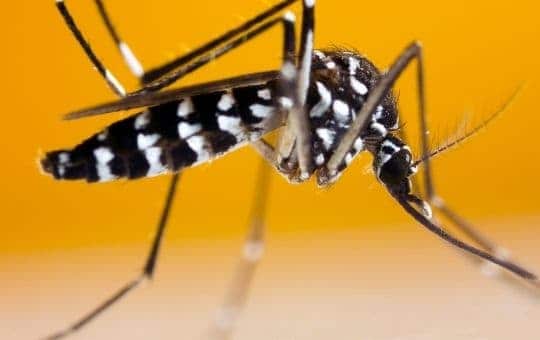Dengue Fever Vaccination - QDENGA®
At Fleet Street Clinic, we offer Qdenga®, the newest Dengue Fever vaccine.
Since its UK licensure in August 2023, we have helped to protect hundreds of travellers against the disease and are one of the few clinics in London to stock the vaccine.
Our expert team of nurses has a wealth of knowledge on the topic and offer a service that ensures patients are well-informed and comfortable with their decision on whether to vaccinate with Qdenga®.
Here’s what some of our patients have said:
‘I flew all the way from the United States to get the Dengue vaccine, and I got it at Fleet Street. Excellent service and knowledgeable professionals throughout the experience. Highly recommended!’ – Google review
‘Everything was so excellent when I went for the Dengue Fever Vaccine. The vaccine nurse explained all about it and was patient. Highly recommend!’ – Trustpilot review
‘Swift care in travel clinic, the nurse had good knowledge about the dengue vaccine I was there to have.’ – Google review
What is Dengue Fever and where is it found?
Dengue fever is an unpleasant viral infection spread by bites from infected Aedes mosquitoes.
These mosquitoes are most active during daylight hours (unlike the mosquitoes that spread malaria, that bite mainly at dusk and during the night).
Dengue fever is common throughout the tropics, including the Caribbean, South and Central America, Africa, Asia and the Pacific, with well over 13 million cases reported to the World Health Organisation during 2024. There is currently a major outbreak in progress in South America and the Caribbean, with over 12.2 million cases reported from South America alone, dwarfing statistics from all previous years. In the last two decades, the World Health Organization (WHO) has documented a striking rise in global incidence, with and dengue is now present in over 140 countries. As a result, Dengue has become the most common cause of fever in travellers returning from Southeast Asia, beating malaria for the top spot.
With the rise in global temperatures, dengue is also spreading beyond its traditional strongholds. Sporadic outbreaks have been reported in Europe including southern France, Greece and Spain, and can be expected to increase as the mosquito vector continues to proliferate into new areas. In February 2025, health authorities confirmed 2 locally acquired cases of dengue in Madeira, The previous last outbreak was in 2012-2013.
Any traveller who visits an area that has a risk of dengue is at risk of contracting dengue fever.
CAN ANYONE HAVE THE VACCINE?
Qdenga® is licensed for individuals aged 4 years and above.
It is a live vaccine. It is not suitable for everyone, and deciding whether or not to have the vaccine can be complicated, so it’s best to book a consultation with one of our experienced travel nurses to find out if it is the right vaccine for you. It is possible to arrange a remote consultation in advance of attending in person, especially if you will be travelling from afar in order to be vaccinated.
HOW MANY DOSES ARE NEEDED AND HOW LONG DOES IT LAST?
The course consists of two doses, ideally given at least three months apart.
In studies, the first dose provided 82% protection, starting 14 days after administration and lasting for at least three months. A single dose therefore offers good protection if there is not time to obtain a second dose prior to travel.
We always recommend completing the course after your return, though the interval between doses 1 and 2 can be extended for up to a year if you have no immediate plans to travel to a dengue-affected area during the interim.
Because Qdenga is a new vaccine, it is too early to know how long protection will endure following course completion, though it is anticipated to be long-lasting.
There are four strains of dengue (called serotypes). Serotypes 1 and 2 are most common, so effectiveness against them was easiest to demonstrate in clinical trials. Because serotypes 3 and 4 were not circulating at the time, less is known about the vaccine’s effectiveness against them.
Studies have shown vaccination to be well-tolerated.

Tight on time before departure?
Don’t worry—getting at least the first dose of your travel vaccinations is crucial.
We understand that last-minute travel plans can make it challenging to complete the full vaccination schedule. Even if you're pressed for time, we strongly advise receiving the first dose.
The vaccine protects well from the first dose, which should be given at least 2 weeks before departure. Remember, it is important to get the second dose before you next travel to another dengue-endemic region.
Don’t let time constraints compromise your health and well-being.
CAN I BE VACCINATED WITH QDENGA® IF I HAVE ALREADY HAD DENGUE FEVER?
Yes, this makes you the perfect candidate.
If you have had Dengue fever in the past, a second natural infection could be more severe, so it is especially important that you are protected.
Qdenga® provides protection against all four strains of Dengue, and this has been shown to be more robust in those who have previously been infected.
Even if you have been infected with one strain previously, the vaccination will protect you from the other strains.
CAN I BE VACCINATED IF I HAVEN’T PREVIOUSLY HAD DENGUE?
The short answer is yes, in the UK the vaccine has been licensed for travellers aged over 4 years of age.
From the start of Qdenga’s 5-year clinical trial period, and during careful subsequent surveillance that includes several million doses administered globally, there have been no safety signals to indicate that this is a problem. This said, there are some intricacies that need to be discussed before deciding if the vaccine is right for you.
These include considering theoretical concerns raised by a UK advisory body (the JCVI), that need to be balanced against the real risk of infection when visiting an area of high prevalence, especially now that there are some significant outbreaks under way. Follow these links to find out more about recommendations from JCVI. The World Health Organisation states that “the benefits of vaccination with TAK-003 [Qdenga] are lower for travellers who have never experienced dengue infection (and are therefore seronegative) compared to travellers who are seropositive”. In several European countries, the vaccine is recommended more widely to travellers who will be at risk.
Our expert travel nurses are well versed in the issue around vaccinating with Qdenga®, and will be happy to discuss them fully with you, and guide you through the decision-making process.
CAN I FIND OUT IF I HAVE HAD DENGUE IN THE PAST
There is a blood test available to help determine if you have previously been infected, but interpretation is complicated due to cross reactivity with other viruses from the same family. In our experience, testing has not proved helpful, when deciding whether to be vaccinated.
Book an appointment to discuss whether this is the best option for you.
IF YOU FEEL UNWELL WHILST TRAVELLING:
You must seek medical attention if you develop any feverish illness whilst travelling.
If you are unwell on your return home, book an appointment with one of our doctors. As well as dengue, it is especially important to rule out malaria.
FAQS
Yes – QDenga® is a new travel vaccine that can prevent Dengue Fever.
Fleet Street Clinic were one of the first providers in the UK to offer Qdenga® to their patients and the general public.
We are based in London and offer this new Dengue Fever vaccine in additional to all other specialist travel vaccinations such as Yellow Fever and Rabies.
At Fleet Street Clinic, the price for each dose of Qdenga® is £148
Qdenga® is administered in a two-dose series for optimal protection, with the doses given three months apart.
Additionally, there is a fee of £28 for a travel consultation, during which you will meet with a knowledgeable travel nurse to thoroughly discuss your upcoming trip and assess any associated risks.
If Qdenga® is deemed suitable based on the consultation, you will receive the first vaccination during that appointment.
Dengue Fever is not endemic in the UK, meaning that it is not found in the UK.
Dengue fever is primarily found in tropical and subtropical regions, where the Aedes mosquitoes that transmit the virus thrive.
While there have been occasional cases of Dengue Fever reported in travellers returning to the UK from affected areas, sustained transmission within the UK population is not a concern.
You also cannot catch Dengue Fever directly from another person. In the UK, it is classified as a travel-associated infection.
In 2023, the number of cases of Dengue Fever in Europe rose so it is always a good idea to check the latest updates from public health authorities for the most accurate information.
Over half the world’s population is at risk at dengue, across over 140 countries.
It is especially common in humid and tropical destinations including:
- Latin America and Caribbean,
- Africa,
- Australia,
- The Pacific Islands,
- Asia,
- Southern Europe.
Many individuals who contract dengue may have no symptoms, but some may become extremely unwell.
Symptoms of dengue fever include:
- fever,
- muscle pain,
- headache,
- pain behind the eyes,
- vomiting,
- rash.
Whilst a large proportion of infections will be self-limiting, some individuals may develop a more severe illness – severe dengue fever which in some cases can be fatal.
Symptoms usually begin within 3 to 10 days following an infective bite.
Symptoms are easily confused with those of other infections, including malaria, chikungunya and other viral infections. Malaria can be rapidly fatal, so any fever in relation to travel needs to be assessed urgently and carefully.
If you return from your travels feeling unwell, book an urgent appointment with one of our doctors. It is important to make it clear that you have been away, so they can conduct the necessary tests to determine the cause of your sickness.
When a mosquito bites a person infected with the Dengue virus, it can become infected and then transmit the virus to other people it subsequently bites.
Preventing mosquito bites protects against dengue as well as other mosquito-borne diseases.
In addition to vaccination, travellers should:
– Cover up – wear long sleeves, long trousers, and socks
– Use 50% DEET insect repellent on clothing and exposed skin
– Always carry repellent with you, in case of surprise mosquito attacks!
– Consider treating clothes with permethrin
– Sleep in a screened, air-conditioned room, with a plug-in insect killers
– Sleep under bed nets if this is not possible
– Be aware of possible mosquito breeding sites (e.g. water containers, stagnant water) close to your accommodation, and avoid them or ask for them to be treated.
Yes, QDenga® became available in the UK in 2023.
It is a new Dengue Fever vaccination.
We were one of the first providers in the UK to add Qdenga® to their travel clinic service.
Fleet Street Clinic is a specialist travel clinic based in London which offers Qdenga®, in addition to all other specialist travel vaccinations such as Yellow Fever and Rabies.
There is no specific antiviral treatment for Dengue Fever, so treatment consists of supportive care. In severe cases, where there is a risk of complications like severe bleeding or organ impairment, hospitalisation may be necessary.
Treatment of severe dengue has improved considerably in recent years, and the vast majority of people with Dengue Fever recover completely.
In addition to vaccination, prevention through mosquito bite avoidance is key, particularly in areas where Dengue Fever is endemic. This includes using mosquito repellent, wearing long sleeves and pants, and using mosquito nets and screens.








